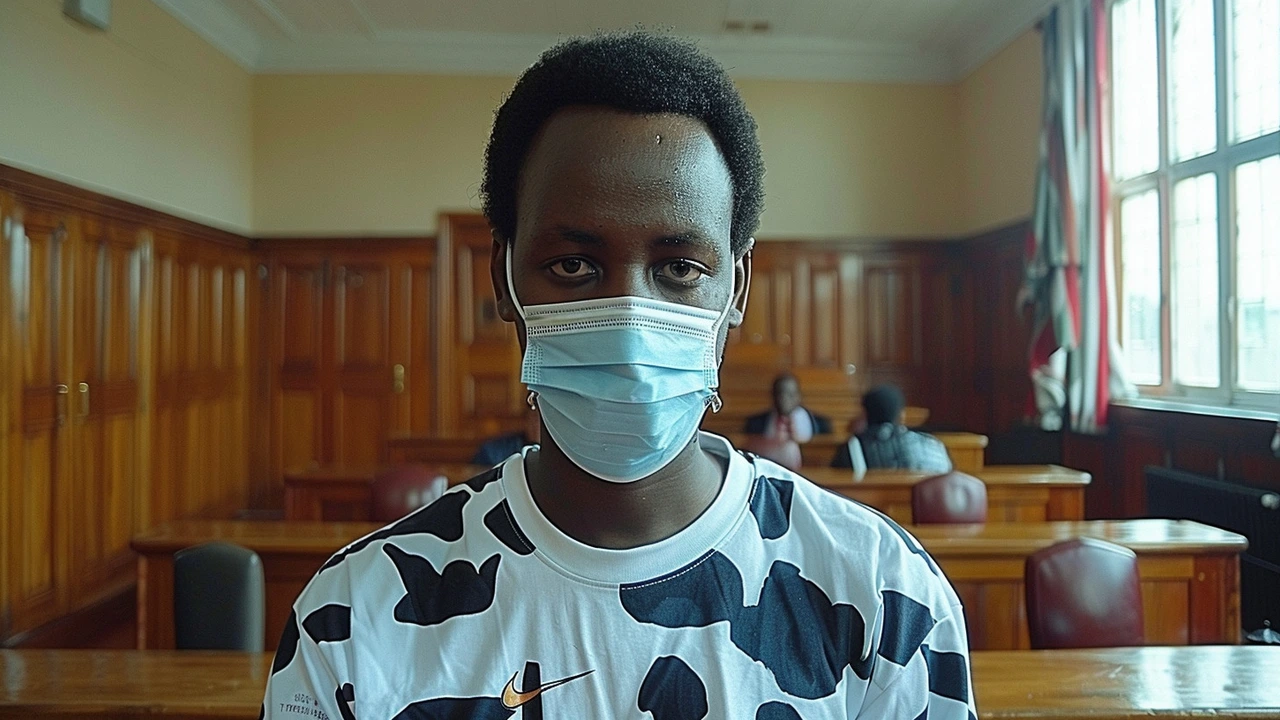Teen’s Release on Sh700,000 Bond Sparks Debate Amidst Police Assault Allegations

Teen's Release on Bond Sparks Debate Amidst Police Assault Allegations
The Milimani Law Courts were filled with tension as 19-year-old Ian Njoroge, a student, was released on a Sh700,000 bond. This decision came despite fervent objections from the prosecution, underscoring the contentious nature of the case. Njoroge stands accused of a serious crime - assaulting a police officer along Kamiti Road and robbing him of a communication gadget, an offense that has sparked considerable debate among legal professionals and the public alike.
The Incident and Charges
The sequence of events leading up to Njoroge’s arrest paints a disturbing picture. According to the police report, the young student allegedly assaulted a police officer on duty and forcibly took his communication device. The charge, specifically categorized as 'robbery with violence', typically warrants severe legal repercussions under section 96(2) of the Penal Code. However, it was this very section that would become a focal point in the courtroom discourse.
Prosecution's Standpoint
The prosecution, led by the Director of Public Prosecutions, insisted on denying Njoroge bail, portraying the incident as a grave offense against law enforcement. They argued that allowing bail would not only trivialize the severity of the assault but could also pose a risk to Njoroge himself. They suggested that other police officers might seek retribution, adding layers to the existing criminal ramifications. Moreover, claims were made that Njoroge was a potential flight risk, potentially fleeing the judicial process, which further fueled their argument for detention.
Defense's Argument
On the flip side, Njoroge’s legal team, spearheaded by Duncan Okatch, presented a robust defense. Okatch dismantled the prosecution's arguments by first addressing the constitutional validity of the charges. He emphasized that the section under which Njoroge was charged had been declared unconstitutional by the High Court, rendering the charges baseless. Okatch also dismissed the notion that Njoroge was a flight risk, pointing out the lack of any substantial evidence to support this claim. As for the danger posed by the police, Okatch argued that it was speculative and insufficient grounds for detaining a young student.
Magistrate's Ruling
Principal Magistrate Ben Mark Ekhubi's ruling was met with mixed reactions. Weighing the arguments from both sides, he determined that the prosecution had not presented enough concrete evidence to warrant denying bail. Ekhubi also highlighted the unconstitutionality of the robbery with violence charge, which critically weakened the prosecution's application. Hence, he deemed it just to grant Njoroge bail, setting it at a substantial Sh700,000 that reflects the seriousness of the allegations while ensuring due process.
Public and Legal Reactions
The decision has ignited a considerable debate within the legal community and the public at large. On one hand, there are those who believe that granting bail in such a case undermines the authority of law enforcement. On the other hand, many see it as upholding the justice system's integrity, ensuring that even those accused of serious crimes are entitled under the law to constitutional protections. The case has thus spotlighted the complexities of balancing justice, public safety, and individual rights.
| Stakeholder | Perspective |
|---|---|
| Prosecution | Denial of bail due to seriousness of the offense and potential danger |
| Defense | Unconstitutional charge and insufficient evidence for denial of bail |
Implications for Future Cases
This case may set a significant precedent in how similar cases are handled in the future. The ruling underscores the importance of upholding constitutional rights, even in the face of serious charges. It also shines a light on the accountability mechanisms within law enforcement and encourages a more cautious approach to ensure charges are firmly grounded in constitutionally valid laws.
In conclusion, as Ian Njoroge awaits further court proceedings, the case serves as a crucial reminder of the delicate balance required in the justice system. It raises questions about how the law interprets and applies rules, especially when assessing the actions of law enforcement versus the rights of individuals. The coming weeks will undoubtedly keep the public and legal observers keenly interested in the unfolding developments of this case.






Jordan Bowens
June 8, 2024 AT 17:33Whoa, talk about a courtroom circus – a teen walks free on a mountain of cash while the cops scream foul.
Kimberly Hickam
June 13, 2024 AT 22:33One must contemplate the profound dialectic between the ostensible authority of the state and the inviolable rights of the individual, for this case is a microcosm of the perennial struggle between power and liberty. The magistrate's decision to set bail at Sh700,000 is not a mere fiscal transaction but a symbolic gesture that reverberates through the jurisprudential fabric of our society. It underscores the principle that even the gravest accusations do not eclipse constitutional safeguards. Moreover, the declaration of unconstitutionality of section 96(2) by the High Court acts as a reminder that legislative overreach must be checked by judicial prudence. The prosecution's insistence on denial of bail, predicated on speculative danger, reveals a tendency to conflate fear with fact, thereby eroding the presumption of innocence. In contrast, the defense's invocation of constitutional validity is a testament to the resilience of legal advocacy in the face of prosecutorial zeal. The public discourse surrounding this matter, while fervent, must be tempered by an appreciation for due process, lest we sacrifice justice at the altar of expediency. Let us not forget that the rule of law thrives not on the whims of emotion but on the steadfast application of equitable principles. The ripple effects of this ruling may well influence future cases involving alleged assaults on law enforcement, prompting a reexamination of bail standards and evidentiary thresholds. In sum, the balance struck by the court – a substantial bond coupled with a recognition of constitutional rights – epitomizes the delicate equilibrium that underpins a democratic legal system. It is incumbent upon us, as custodians of civic discourse, to engage with this narrative not as spectators of sensationalism, but as participants in a broader dialogue about justice, accountability, and the enduring promise of the law.
Gift OLUWASANMI
June 19, 2024 AT 03:33Yo, while the drama unfolds, remember the legalese: if the charge itself is a ghost, why toss the kid into a bail nightmare? The court’s call shines a light on sloppy statutes that need pruning. This isn’t just about one teen; it’s a lesson for every prosecutor thinking they can weaponize vague sections.
Keith Craft
June 24, 2024 AT 08:33In the grand theatre of jurisprudence, the curtains rise on a bittersweet aria; a youthful soul, shackled by accusation, now walks the precipice of liberty with bonds of silver. Yet the melody is tinged with melancholy, for the echo of a badge’s clang still reverberates in the corridors of conscience.
Kara Withers
June 29, 2024 AT 13:33For anyone looking for context, the unconstitutionality ruling means the statute can’t be applied, so the bail decision aligns with that legal reality. It’s also worth noting that the prosecution’s flight‑risk claim lacked concrete evidence, which the judge rightly highlighted.
boy george
July 4, 2024 AT 18:33The court’s move is logical; bail reflects seriousness without ignoring rights.
Cheryl Dixon
July 9, 2024 AT 23:33It’s curious how some folks love to glorify law‑enforcement power, yet forget that the same system protects the accused. The bail amount, while steep, is a compromise that respects both public safety and personal liberty.
Ramesh Modi
July 15, 2024 AT 04:33Ah, the eternal dance of righteousness versus authority! One must ask: is the bond a mercenary price for freedom, or a beacon of due process shining through the fog of accusation? The magistrate, in his wisdom, chose the latter, reminding us that justice is not a tyrant’s whim but a balanced scale.
Let us celebrate this triumph of principle over panic!
Ghanshyam Shinde
July 20, 2024 AT 09:33Sure, the police say they were attacked, but the law says the charge is shaky. Seems like a classic case of blowing things out of proportion.
Charlotte Louise Brazier
July 25, 2024 AT 14:33I get the frustration on both sides, but we need to protect constitutional rights while also ensuring public safety. The judge’s balanced approach is a step in the right direction.
SAI JENA
July 30, 2024 AT 19:33Encouraging the community to view this as a learning moment; the legal system is showing flexibility, and that’s a positive sign for future jurisprudence.
Donny Evason
August 5, 2024 AT 00:33The cultural implications are profound – when a legal system upholds its own constitution, it sends a message that law is a living, breathing entity, not a rigid instrument of oppression. This case will likely be cited in law schools across borders as an example of constitutional vigilance.
Hariom Kumar
August 10, 2024 AT 05:33Great news! 🎉 The system still works, and a young person gets a fair chance. Keep the hope alive! :)
Phillip Cullinane
August 15, 2024 AT 10:33From a procedural standpoint, the magistrate’s decision adheres to the principle of proportionality, balancing the severity of the alleged conduct against the incumbent evidentiary standard. The absence of concrete flight‑risk indicators weakens the prosecution’s pre‑emptive detention argument. Moreover, the High Court’s prior declaration of unconstitutionality of the relevant statutory provision renders the charge legally untenable, further justifying bail. In practical terms, the Sh700,000 bond serves both as a deterrent and a safeguard, ensuring the defendant’s return while mitigating potential public safety concerns. This calibrated approach exemplifies best practices in pre‑trial release jurisprudence.
Janie Siernos
August 20, 2024 AT 15:33While the court showed restraint, we must remain vigilant that such leniency doesn't embolden assaults on officers.